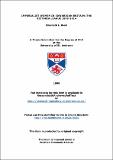Files in this item
Imperialist women in Edwardian Britain : the Victoria League, 1899-1914
Item metadata
| dc.contributor.author | Riedi, Elizabeth L. | |
| dc.coverage.spatial | 230 | en_US |
| dc.date.accessioned | 2012-06-20T10:52:37Z | |
| dc.date.available | 2012-06-20T10:52:37Z | |
| dc.date.issued | 1998 | |
| dc.identifier.uri | https://hdl.handle.net/10023/2820 | |
| dc.description.abstract | This thesis, based on private papers, society records, autobiographies and memoirs, newspapers and periodicals, examines one mainly female imperialist organisation - the Victoria League - and the women who ran it. It considers two related questions - what made Edwardian women imperialist, and how, within the limits of Edwardian society, could they express their imperialism? The thesis shows that several of the League's founders and executive had visited South Africa during or shortly before the Boer War, and that this experience, particularly for those who came into close contact with Milner, was pivotal in stimulating them to active imperialism. The Victoria League, founded April 1901, aimed to promote imperial unity and a British South Africa in a variety of suitably 'womanly' ways: Boer War charities, imperial education, exporting literature and art to the white dominions (particularly the Transvaal), welcoming colonial visitors to Britain, arranging for the welcome of British settlers in the colonies, and promoting social reform as an imperial issue. It worked overseas through a number of independent Victoria Leagues in Australasia, the Imperial Order, Daughters of the Empire in Canada, and the Guild of Loyal Women in South Africa; and at home with a number of similar (though largely male) imperial propaganda societies. The thesis also considers the Victoria League's attitude to race, particularly through its debate over entertaining Indian students. It ends with a discussion of the options available to imperialist women; and of the obstacles they faced in questions of authority (how far and in what ways a woman could pronounce on imperial subjects) and of ideology (as expressed through the anti-suffrage campaign). It concludes that the Victoria League, by transferring areas of activity long acknowledged as 'feminine' to the imperial stage, redefined areas of female competence and enlarged woman's 'separate sphere' to include the active propagation of imperialism. | en_US |
| dc.language.iso | en | en_US |
| dc.publisher | University of St Andrews | |
| dc.rights | Creative Commons Attribution-NonCommercial-NoDerivs 3.0 Unported | |
| dc.rights.uri | http://creativecommons.org/licenses/by-nc-nd/3.0/ | |
| dc.subject.lcc | DA570.R5 | |
| dc.subject.lcsh | Great Britain--Foreign relations--1901-1936 | en_US |
| dc.subject.lcsh | Great Britain--History--Edward VII, 1901-1910 | en_US |
| dc.title | Imperialist women in Edwardian Britain : the Victoria League, 1899-1914 | en_US |
| dc.type | Thesis | en_US |
| dc.type.qualificationlevel | Doctoral | en_US |
| dc.type.qualificationname | PhD Doctor of Philosophy | en_US |
| dc.publisher.institution | The University of St Andrews | en_US |
This item appears in the following Collection(s)
Except where otherwise noted within the work, this item's licence for re-use is described as Creative Commons Attribution-NonCommercial-NoDerivs 3.0 Unported
Items in the St Andrews Research Repository are protected by copyright, with all rights reserved, unless otherwise indicated.


